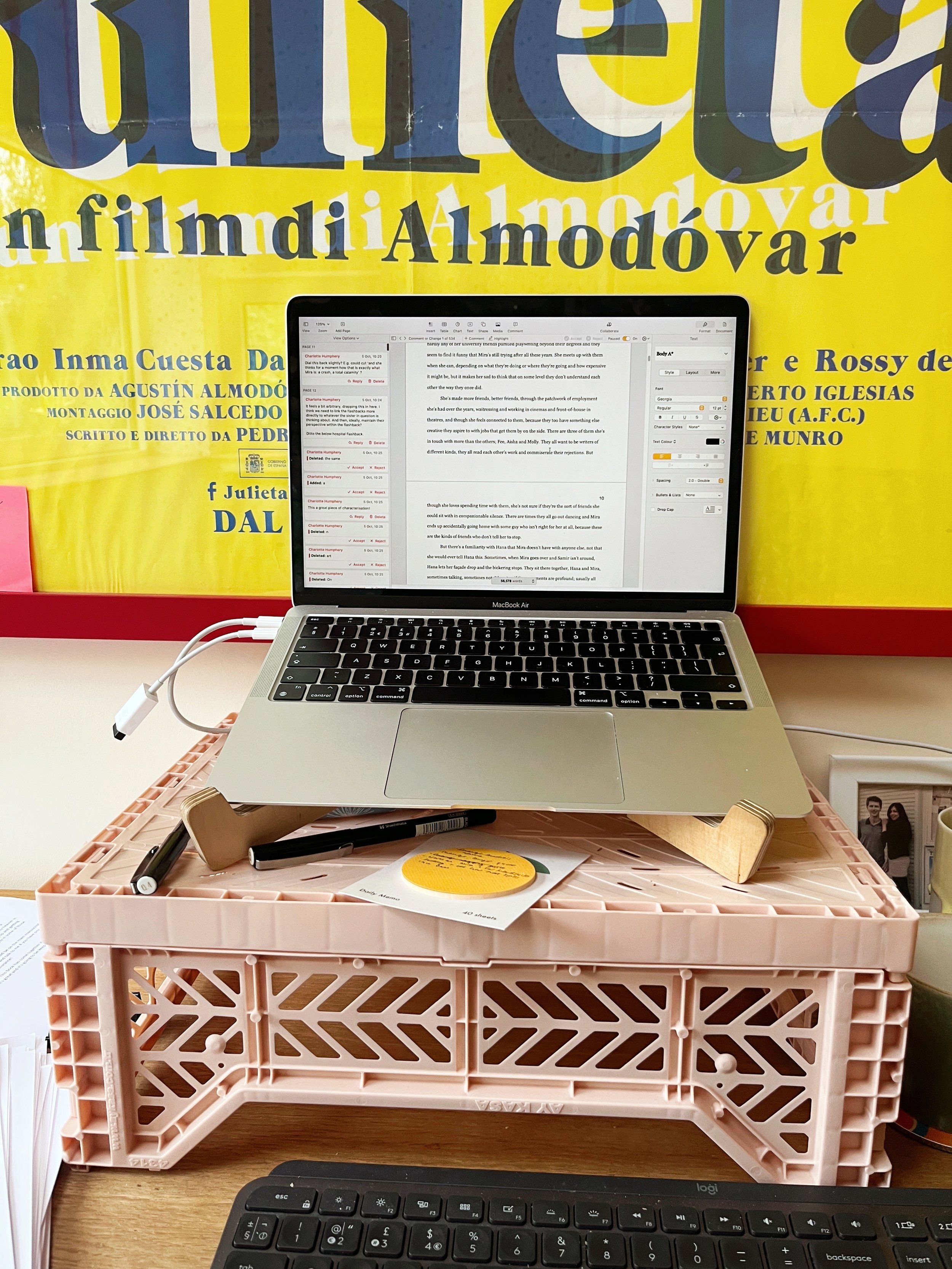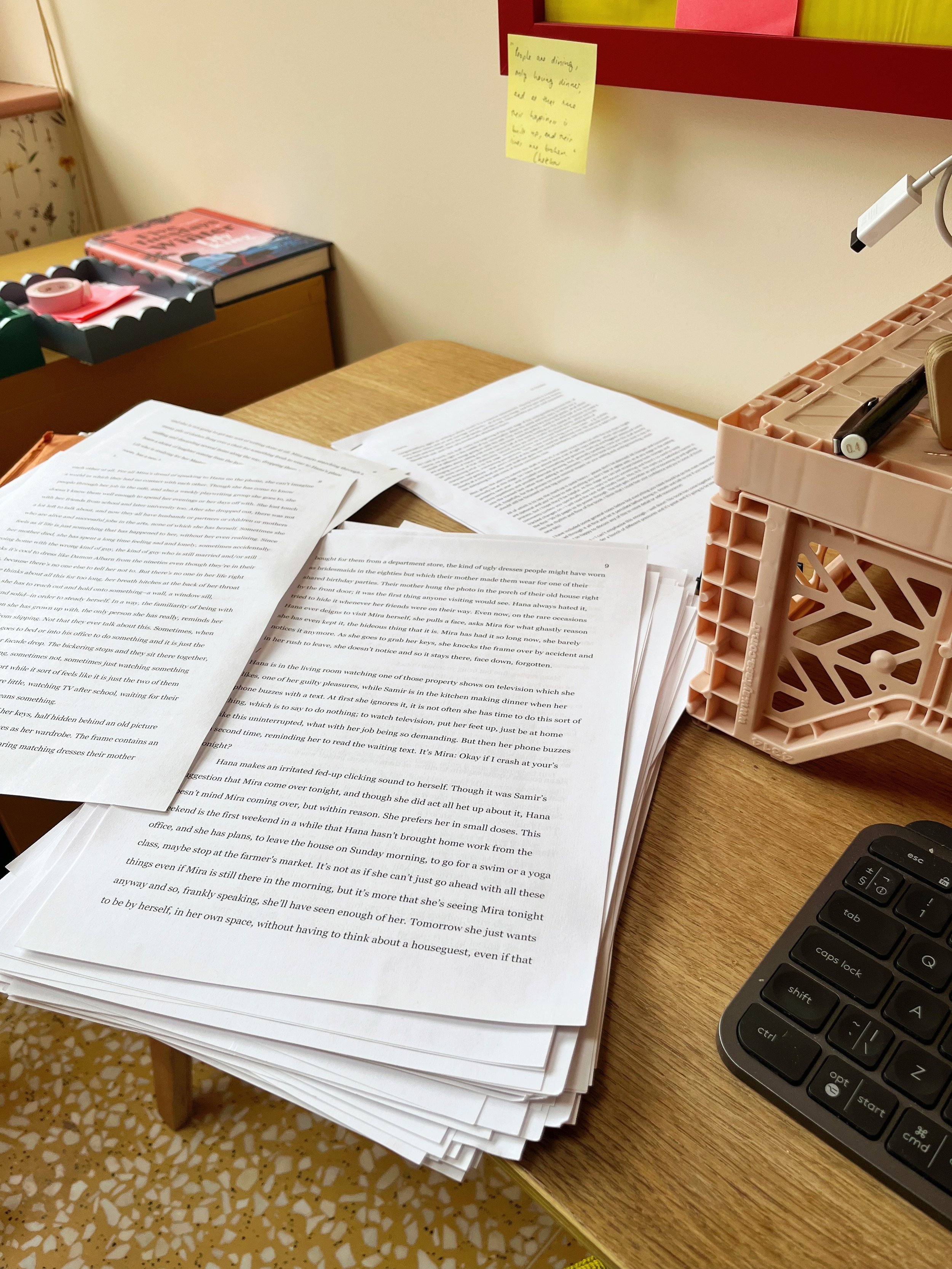A Letter To My Future Self: 14 Lessons Learnt From Writing A Novel
Scenes from my writing room, my novel at various stages
If you’re familiar with my newsletter, Dear Huma (also called ‘the most beautiful email I’ve ever read’ by one lovely subscriber), you’ll know that every month I offer agony-aunt style advice on life and writing. For this week’s blog, I’ve decided to write my own Dear Huma to myself, a letter to my future self of things I’ve learnt from writing a novel, and things to remember for next time, so that whenever I am feeling overwhelmed, I might be able to return to this.
I hope it might help anyone else who needs to hear these things.
Dear Huma,
You’ve done it. You’ve finished. You’ve finished your novel. This is great! This is amazing! You’ve earned the right to be proud of yourself, even if this feeling doesn’t come naturally and all that means is just sitting with it for a couple of minutes.
I know, I know. It’s not like you’re out there celebrating, I mean, let’s not get ahead of ourselves, the book’s not actually going to be published for another six months. And who knows what people will even think! But still, you have written another book, and this is pretty amazing, considering how so many odds were against you whilst writing (hi, pandemic, house renovation and homeschooling three children).
I understand that rather than the urge to celebrate, you’ll simply be feeling content right now. Know that this is a more than good enough feeling. Often your emotions can be extreme and you are all over the place, so contentedness is actually a pretty good place to be! So take a moment. Enjoy being in a more even-keeled kind of state and while you’re at it, maybe think about how nice it would be if you could be more like this, say, maybe eighty percent of the rest of the time.
Anyway, now that you’ve finished your novel, how about we see what lessons we’ve learnt and what we can remember for next time? Anything that makes it slightly less stressful, right? Right!
So here’s a list of 14 things to remember, for the next time you start writing a book. Whenever you feel panicked or overwhelmed, please promise me that you will return to this, instead of listening to that other voice in your head (I don’t know why you listen to her anyway, I’m so much nicer).
14 Things To Remember Next Time You Write A Book:
1) You will complain about deadlines but they are good for you
Ask yourself: do you really want to be working on a draft, the same draft, for more than two years? No. Didn’t think so. Besides which, you’re a nerd, you’ve never missed a deadline anyway. You work well to them. They are good for you. So keep your head down, and stop complaining.
2) Please for god’s sake look after yourself.
Take your supplements. Don’t forget to start the day with protein. Be asleep by 10.30, if not earlier, when you’re writing. Drink 10 glasses of water! Your last book caused you so much stress, you got diagnosed with an autoimmune condition; let’s try not to go down that road again?
3) You will cry a lot and feel worthless
I’m not going to tell you not to cry, because I know you will anyway. It’s okay, just let it all out. It’s probably just your hormones anyway. But also, please know you’re not worthless. You’re an award-winning writer! You can do this. You’ve done it four times before.
4) Listen to your husband when he’s consoling you
Because for some reason you never do. Though he may not be a writer, he understands something of what this means to you so when he tells you that it’ll be okay, that you’ll figure it out, that you’ll know what you need to write because you always do, please try to believe him. And remember, try to be kind; he’s only being nice to you.
5) Forget ‘writing tools’
Sure, there are other writers who use bulletin boards and Scrivener and Ikea drawing rolls and Excel spreadsheets to plan their writing out before doing anything else. But you are just not that kind of writer. Remember, you have tried all these things and they didn’t work for you, all they did was waste time and money. These things are distracting! All you need is a notebook to scribble in and a laptop to write on. Don’t be swayed otherwise.
6) Trust your instinct
Because even though you might doubt yourself in so many ways, know that you do have good instincts. You’ll know if your writing is working. You’ll know if the pacing is off. You’ll know if a line is beautiful or bad. You’ll hear it, you’ll feel it. You can just tell, because this is what you’ve been working towards your whole life (all that reading). Your instinct is what will get you through moments of doubt and uncertainty. Trust it. It has never let you down.
7) Don’t overcomplicate it
What’s that you tell your writing students? A story is when something happens and maybe a few more things happen, but the important thing is that it all means something to someone. See also that Chekhov quote you like (he puts it more eloquently than you): ‘People are dining, only having dinner, and in that moment their happiness is built up and their lives are broken.’ That’s all writing a novel is. Dinner and a shitshow. That’s all this is.
8) The shitty first draft phase will kill you, but it will get so much better after that
Just, you know, HANG ON IN THERE.
9) If you’re stuck, write a short story
Because you can, and you’re good at it, and it’ll make you feel confident when you feel like you’re lost in longform and can’t remember how to write at all. Short stories are your first writing love, and you love the process. The satisfaction of taking a break from a bigger book to write something short and strong will reset you and give you an incredible confidence boost.
10) You’re not alone
You have an amazing agent and amazing editors. Don’t be afraid to seek their opinion on your writing sooner rather than later, because when you do show them something you’ve been working on, you always wish you’d done it earlier - it’ll save literally months of anxiety, lying awake at night wondering if any of it is any good.
11) By the way, don’t forget you run your own business
I get it, you get so busy and caught up with your writing, that it’s hard to keep up with your teaching, your newsletter, your writing courses. But don’t let it slide. You’ve worked so hard on all of it! You have something so special to offer, you can tell from the response you get from your writing students and subscribers. Don’t forget to keep up with all of this, after, all it’s how you make a living, and schedule as much as you can in advance.
12) Give yourself a break.
Don’t punish yourself by staring at your screen if the writing’s just not happening. I don’t know how many times I have to say this, and I don’t know if it will ever sink in, but the world won’t end if you take a day off writing. Remember: watching films and getting out of the house is good for you. It’s good for your writing process.
13) Try not to miss the kids’ bedtime
Not to make you feel guilty AT ALL, but. . . don’t let writing be the biggest thing in your life at the expense of the smallest people in your life. It doesn’t have to be either/ or and though it’s not historically been easy for you to manage this, remember your boundaries. You don’t have to write to deadline in school holidays. It’s okay for publishers to wait a little.
14) Remember why you’re doing this
Because you have no other transferable skills. (Just kidding!) Because writing is the only thing that makes sense to you. Because even though writing may at times feel hard (and it is meant to), the idea of a life without writing at all is even harder to fathom. Remember what it feels like to put down in words a feeling; how it might speak to someone, how it might reach them. Characters you can’t stop thinking about. The beauty of crafting sentences. The satisfaction of a plot twist. The joy of finishing what you’ve started. All of this, this is why you write. Remember it.
Write with me
Miniature Worlds
Online Short Story Writing Course with Award-Winning Author Huma Qureshi
An invitation to discover and absorb my short story writing process so you can apply it to your own work. With my guidance, you’ll learn how to write short stories that linger with your readers long after they’ve turned the last page.
‘This is the most intimate writing course I have ever taken. I feel so held and you have been so generous with what you know.’ (Student testimonial)



